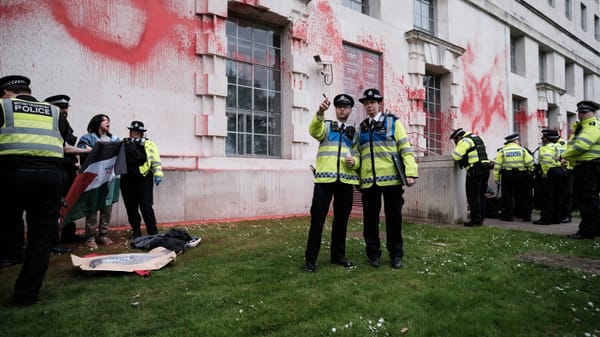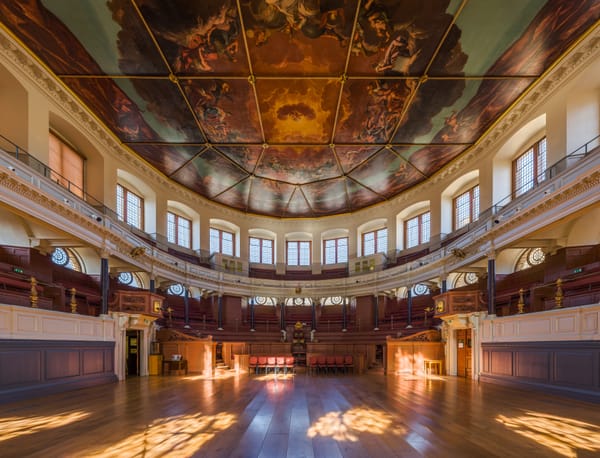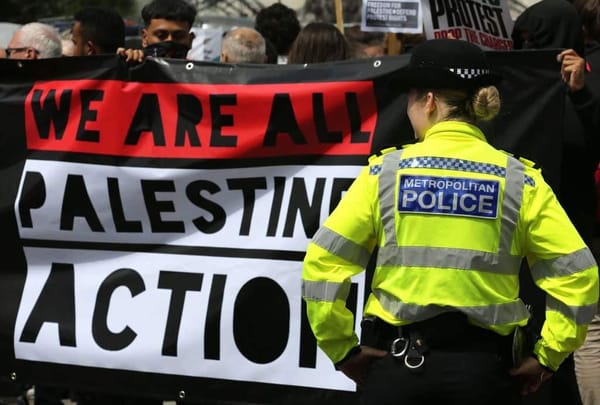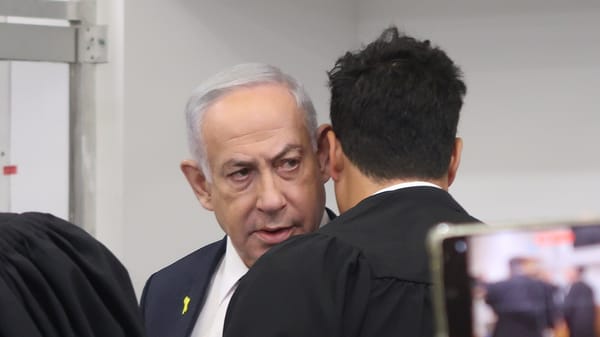For a Middle Eastern Romantic
Can theatre heal the wounds of settler colonialism?
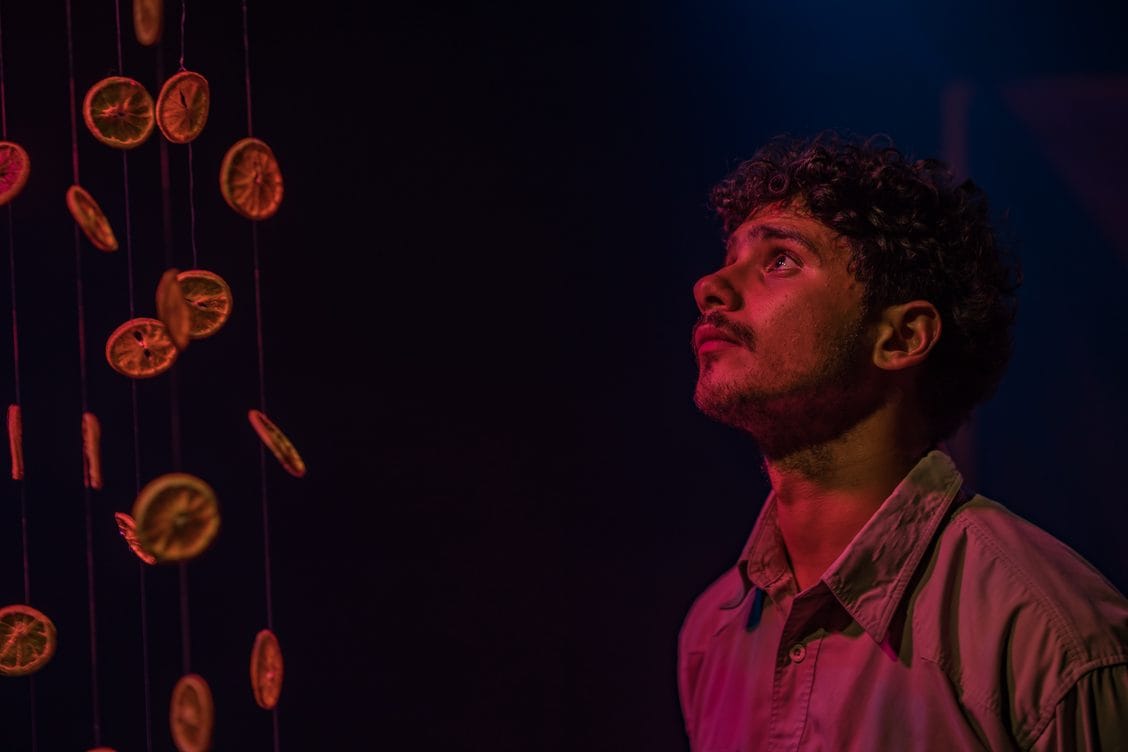
Having captivated audiences when it appeared as a work in progress last year, For a Palestinian premiered as a full-length production at the Camden People’s Theatre last month to sell-out crowds and rave reviews.
The play, which will run again for three nights next week at the Bristol Old Vic, examines the life of Wa’el Zuaiter, a Palestinian translator and political activist born on 2 January 1934 in Nablus. Zuaiter left his homeland to study in Baghdad before settling in Rome, where he worked for the Libyan embassy and was a representative of the Palestine Liberation Organisation (PLO). During his time in Italy he began an intense romance with Australian artist Janet Venn-Brown – whose book, For a Palestinian: A Memorial to Wa’el Zuaiter, gave the play its name – and embarked on a translation of his beloved One Thousand and One Nights.
However, this project was never completed. His time was swallowed up by an ardent engagement in Palestine advocacy, particularly following the Naksa of the Six-Day War in 1967. Then, after the killing of 11 Israeli athletes and coaches at the 1972 Munich Olympics by the militant Palestinian organisation Black September, Zuaiter was suspected by the Israeli regime of being associated with the group, labelled a terrorist, and put on an assassination list. On 16 October 1972, he was shot dead on his doorstep by two Mossad agents – the first in a string of extrajudicial killings that took place under the covert Operation Wrath of God. His murderers, like the murderers of countless other innocent Palestinians, have never been held to account.
The play unfolds this heartbreaking biography with great care, along with some touching and joyous embellishment. But between the orange groves of Jaffa and the piazzas of Rome, the play also tells the tale of Bilal Hasna, its co-author and sole performer. Through uncovering Zuaiter’s story, Hasna, who is Palestinian, embarks on his own journey of discovery. Side-by-side, the two accounts expose the continuities and ruptures between history and the present, at a time when the narratives around Israel and Palestine are shifting dramatically.
Debbie Shamir sat down with Hasna and his co-author, Aaron Kilerciolgu – a theatre- and filmmaker with Turkish-Jewish-Canadian heritage, who also directed the play. As you’ll see in their conversation below, the three explore the intentions for this piece of political art, and discuss how theatre can be used as a powerful medium to tell stories that might otherwise be forgotten.
Debbie Shamir: Where did you find this story?
Aaron Kilerciolgu: Two years ago we started working on a play that would incorporate my experience as a Jewish-Turk in the diaspora, and Bilal’s. We found this story, For a Palestinian, written by Zuaiter’s partner, Janet, and realised this story had to be about Wa’el and his story and his life, and politics, which kind of expressed everything we wanted to say with our original idea.
Bilal Hasna: We came across this novel, Apeirogan, by Colum McCann, a novel which mentions an exhibition of Wa’el’s life and were like, “who is this guy?” We found a little bit more information but probably not enough to write a play. Then we came across the book, For a Palestinian, about Wa’el by his partner Janet Venn-Brown, and realised his life was extraordinary.
But we also realised that this should be a love story: of Wa’el’s romantic love for Janet, and of his love for his homeland.
DS: Why did you decide to make love so central in what some would describe as an incredibly sad story?
BH: Often people talk about Palestine and Palestinians, as if they were incapable of experiencing joy, happiness and love. When I go to Palestine, my family don't talk about the occupation – we talk about food and weddings, about how funny my granddad was. If you strip Palestinians of their capacity for joy – made all the more extraordinary because it’s joy borne of oppression – you’re just doing them a disservice. Wa’el’s end was tragic, but the rest of his life is so beautiful. I think a lot of people think, especially of Middle Eastern men, that there’s some sort of aggression or violence going on, but so many of the men I know from his generation are just so romantic, head in the clouds. We loved Wa’el because he’s this typical Middle Eastern romantic.

DS: The play features audio recordings of you discussing the playwrighting process; in one exchange, you decide whether or not to incorporate Wa’el’s death in the play. Why did you decide to include the audience in that?
AK: The play exists on three levels. There’s Bilal today, who wants to continue this legacy and to tell the story of this incredible person. Then there’s Bilal in 2018 finding this story, discovering his Palestinian roots. Then there is Wa’el in the 1960s. The play brings those three strands together. Wa’el represents Bilal’s romanticised hope for what Palestinian life can be: a life that isn’t just reduced to trauma but emphasises joy.
Part of what the show itself is about is the struggle between that desire and the fact of murders and bombings and the occupation – much like how Wa’el’s having this lovely romantic time with Janet and then the war breaks out.
BH: I think the reason we put in that discussion of Aaron and me talking about whether we should put in Wa’el death is because after that point, the play sort of begins to disintegrate; it’s no longer a story about Wa’el and Bilal. Unfortunately there’s this big thing that we need to put in and we don’t know how – I just want to keep indulging in this love story, but we can’t.
As Aaron says in the recording, it doesn't feel right not to mention Wa’el death, but it also doesn't feel right to define him by it.
AK: Part of the play for us is trying to continue a legacy of someone who's been largely forgotten. The image the audience is left with is Wa’el talking about the thing he’s most passionate about: the novel One Thousand and One Nights (he was carrying with him notes for an article to write when he was killed). It was just important for us to end not with his death, but with who he was as a person – this beautiful human being we wish could still be around today.
DS: Was the play intended as a form of artistic resistance?
BH: For the whole first hour of the play the word Palestine isn’t really mentioned. I think that’s so important: Palestinians are not reducible to political history. But obviously the play does become political.
AK: That’s why we partner with these organisations like the Palestine Solidarity Campaign and Na’amod because we want to direct people towards these organisation, because we don’t want audiences to come, feel these things, spend £10 on a ticket and then never think about it again. The ideal thing that we’d love is that when people see another article in the news about Palestine, they feel in a small way what they felt within the theatre, and that hopefully leads them to act.
DS: Did you feel there was anything you couldn’t include, in the context of a global crackdown on pro-Palestinian speech and activism?
BH: I don’t think we censored anything in the play. That was a big priority for us, even though we’re aware of what’s going on, and have seen the recent Meta investigation that has just come out of May last year. There is obviously this crackdown, but we’re lucky to be working with organisations and theatres that never pressured us to censor material – if they had, what would’ve been the point of doing this?
AK: I don’t feel like we’ve censored ourselves at all. I mean, sensitivity was really important to us – we didn’t want to alienate people – but that doesn’t feel like censorship, it just feels like thinking about your audience.
BH: In many ways it is surprising given the landscape that’s also hopeful for the Palestinian narratives can be showcased in the UK without being censored or subjected to confirmation to some sort of agenda that is unproductive and often racist.

DS: Did shifts in the international conversations about Israel and Palestine change the way you wrote the play?
AK: It was serendipitous that we started writing in May last year, just before the Unity Intifada. It was a time of real hope, especially in the west, because Palestine was getting so much more attention here than it has in the past.
BH: The spirit of hope that was created by this unprecedented event runs throughout the whole play, and invigorated us. The plot probably wouldn’t have been different had the Unity Intifada not happened, but maybe our passion for writing and our hope for delivering it to an audience would have.
Obviously, the Amnesty International, Human Rights Watch, and B’Tselem reports are making words like “apartheid” and “settler colonialism” much less controversial. You do feel it every night when I say the words. Maybe that’s because the audiences are largely supporters of the Palestinian cause, but I think that last year did have an effect.
The play holds space for political anxiety as well, like when people stop turning up to Wa’el’s meetings to organise Palestinian resistance in Italy. When over 45 Gazans were killed in August this year, you didn’t see the same numbers come out in the streets, and that is really difficult. I thought: are people going to come see this play? do they think Palestine is relevant anymore? was that last year’s news? But actually, it’s not like that at all.
A magazine called SkinDeep did an issue of Palestinian voices. The issues curator, Zena Agha wrote about how active resistance as a Palestinian is not to conform to the immediacy of the news cycle. Everyday there is something happening in Palestine; every day you feel a pressure to talk about it; every day you feel a pressure to say the right thing. But what if you invested your energy in slower thinking like this play? What are the more long-term acts of creating, thinking and collaborating that really could produce a just future for the Palestinians?
DS: How can British Jews, or allies more broadly, provide better solidarity to Palestinians?
AK: A huge step is to destigmatise speaking about Palestine. I know from my experience – my family is Turkish on one side, Jewish on the other – those conversations are shut down so quickly.
Black Lives Matter talks about the importance of having conversations in your communities. Joining protests is important, and they give us a lot of validation, but what’s just as important is the uncomfortable interpersonal work of destigmatising the Palestinian cause, a big one being BDS.
BH: A big tactic to silence the Palestinian cause is by constantly paint it as a really complicated situation, and I think that scares people. We say in the advocacy sphere that there are things that are complicated, and things that aren’t. What isn’t complicated is the broad political reality of the region, and the active resistance to it.▼
Debbie Shamir is an organiser on the Jewish left, working to challenge the instrumentalisation of antisemitism.
Bilal Hasna is a British, Palestinian and Pakistani actor and writer from London. For a Palestinian is his professional writing debut. He hopes, with all of his heart, to see a free Palestine in his lifetime.
Aaron Kilercioglu is a theatre- and filmmaker. Raised in Vienna by Turkish and Canadian parents, he has recently written plays about diasporic identity formation, Middle Eastern politics, and how fungi might just be the key to saving our world.

